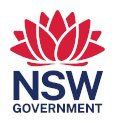As it entered its second year, the Nick Greiner/Wal Murray Liberal/National Coalition Government could look back on a rapid-fire start to the implementation of its program.
Acknowledgement: The text below contains excerpts from the essay, WARM, DRY AND GREEN - Release of the 1989 Cabinet Papers by Dr David Clune as well as links to the relevant Cabinet Papers.
The Cabinet Process
A characteristic of the Government was the importance of ‘Cabinet solidarity and corporate purpose’. In Greiner’s view, Cabinet had to be ‘the main focus of ministerial loyalties. Nevertheless, Greiner believed in letting ministers run their own show, much as he was happy to delegate to officials’. An indication of the emphasis on solidarity is a paper endorsed by Cabinet on 8 August entitled Collective Responsibility and the Pre-Announcement of Government Policy.
The New Agenda
Treasury Secretary from 1985-94, Percy Allan, has said that with the election of the Greiner Government
a concerted effort was made to accelerate the commercialisation and corporatisation of government businesses, which had advanced haphazardly. A formal framework was adopted to clarify the principles and pathway that would define the desired changes in the way government businesses were to operate. New Zealand had already gone down this path, so NSW drew on its experience to enunciate a model that other States (and the Commonwealth) largely replicated.
The Public Service
Public service reform was an imperative for Greiner. His central aims were ‘exposing the public sector to market discipline and refocussing the public service on results rather than inputs and processes’. This meant ‘a greater focus on the individual performance of senior public sector managers’. Greiner was not anti-public service, rather he wanted to ‘raise the effectiveness and status of public servants’.
Deregulation
Deregulation was a focus of Government policy, particularly when it made life easier for consumers. Marketing boards that regulated the sale of agricultural products had long been a feature of the NSW economy. Out-moded regulations on the sale of dairy products were removed and restrictions on alcohol consumption liberalised. On one occasion, Cabinet showed flexibility in dealing with current issues by increasing the regulation of the fencing of private swimming pools in response to drownings of children under five in pools.
Law and Justice
An important part of the Coalition’s policy for the 1988 election was getting tough on law and order. After the scandals of the Wran era, which saw Correctives Services Minister Rex Jackson imprisoned for corruptly releasing prisoners, integrity in the administration of justice was a priority issue for Greiner. Corrective Services Minister Michael Yabsley, when opposition shadow minister, had campaigned heavily on alleged weaknesses in the sentencing, parole and prison systems. A number of measures considered by Cabinet were related to this.
Environment and Agriculture
The environment had an important place in the Greiner Government’s agenda. In Opposition, Greiner had described the Coalition’s philosophical approach as ‘warm and dry’. In Government, particularly due to the commitment of Environment Minister Tim Moore, it became ‘warm, dry and green’. The challenge was to develop policies that were environmentally progressive within the Government’s overall ideological framework.
Water resources
On 2 February, Cabinet approved the creation of a Rural Water Supply Program to provide financial assistance of 50% of the capital cost of rural water projects. This was in fulfilment of an election promise to restore a scheme abolished by the Wran Government.
A review into the water resources industry had been set up in 1988. Natural Resources Minister Ian Causley noted that almost every submission recommended ‘the establishment of a high level co-ordinating committee for the effective management of water resources. He supported the review’s recommendation to establish a Water Resources Council ‘to ensure the Minister for Natural Resources, as resource owner, obtained comprehensive advice and to provide a forum for formal co-ordination at the chief executive level’.
Cabinet agreed to introduce a commercially oriented water pricing policy for irrigators on 4 July. In this instance the Government moved cautiously. Cabinet decided that immediate privatisation ‘was not feasible because irrigators will not accept ownership while infrastructure remains in its poor state (requiring $200M for rehabilitation)’.
New issues and social trends
The 1980s saw new trends and issues come to prominence in State politics. It is sometimes overlooked that the Greiner Government was responsive to these developments. The government approved the amendment of the Anti Discrimination Act (1977) to incorporate race, and proposed changes which resulted in the Aboriginal Land Rights (Amendment Act (1990).

